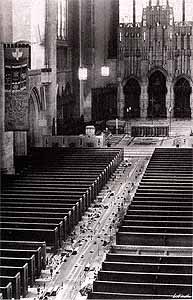
Earlier today a friend dropped off a letter to me that had been sent to the editor of the journal Science & Theology News (July/August 2006, p. 8), and I've been thinking about it the past couple of hours ...
THE PURPOSE OF PRAYER
As a pastor, it's easy to understand why people pray. It's comforting. It can be life-transforming. It's easy to understand why God wants us to pray. It develops a relationship with God just as conversation develops a relationship with people. What I've never understood is why people believe that prayer would make things happen in the world. ("Study Casts Doubts On Medicinal Use Of Prayer" / Science & Theology News, May 2006).
It seems to me that would only affect a change in God's plans if one of two conditions pertained: One, that we could tell God something that God does not already know, or two, that we could suggest a course of action better than the one God had in mind.
Moreover, if the major purpose of prayer, from God's point of view, is to develop a relationship with the people praying, praying a set prayer as part of a study is a bit like asking someone to do something just to see if they'll do it. I find such personal tests annoying, but try to let it pass and to do the right thing regardless of the test. Let's hope God does better than I do. - William R. Clough / Bradenton, FL
I believe that prayer releases God's desire to partner with me, as well as equipping me to hear God's voice and God's plans with a clarity and intensity that I'd have no other way. Do my prayers actually "persuade God"? I'm not sure. There are certainly examples of this happening in the WORD, but from what I know from the whole counsel of God's WORD it seems hard to know for sure if this is how God operates on a regular basis in the lives of people who pray.
But what I have seen is that God seems to comes alongside the humble and the broken in ways more miraculous than He seems to come alongside the proud and the arrogant. I guess that there's just something about our posture before God that either breaks His heart for us, or stiffens up His back against us. And like the alabaster box that Mary broke open and anointed Jesus with (John 12) just before His crucifixion, when God's heart is broken open for us, only good and healing things come out.
William R. Clough certainly writes like a scientist ... linear, logical, methodical thinking. But my life with Christ often seems more abstract than concrete, more mystical than nail-downable, more paradoxical than linear, and more serendipitous than methodical. God does what God does.
And over and over again I find that I can either choose to participate with Him in what He's up to, or I can choose to not participate with Him in what He's up to. Prayer seems to do two things for me and in me ...
- Prayer humbles me ... reminding me of something I all too easily forget (or choose to ignore) -- that God is God and that I am not.
- Miraculously, prayer somehow makes me more open to partnership with God in what He's up to ... no matter how high the cost or weirdness quotient may be.
"Theology is the study of God and
his ways. For all we know, dung beetles
may study man and his ways and call it
humanology. If so, we would probably be
more touched and amused than irritated.
One hopes that God feels likewise."
his ways. For all we know, dung beetles
may study man and his ways and call it
humanology. If so, we would probably be
more touched and amused than irritated.
One hopes that God feels likewise."
Godspeed.
read.think.pray.live.
Gregg
No comments:
Post a Comment